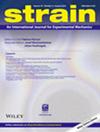Non‐parametric stress field estimation for history‐dependent materials: Application to ductile material exhibiting Piobert–Lüders localization bands
IF 1.8
3区 材料科学
Q2 MATERIALS SCIENCE, CHARACTERIZATION & TESTING
引用次数: 4
Abstract
Estimating stress in statically undetermined tests remains an issue in experimental mechanics. Most estimation methods rely on the a priori choice of a behaviour equation leading to an unavoidable model bias. Recently, efforts have been made to propose methods circumventing the parametric description of constitutive behaviours. In particular, Leygue et al. (2018) proposed a new paradigm called data‐driven identification (DDI). An extension of Leygue's method to history‐dependent materials is proposed in this paper. The formulation of the problem and its resolution are presented with emphasis on boundary conditions. The method is tested on real experimental data where the elasto‐plastic material is subjected to the formation of Piobert–Lüders bands. We finally show that the DDI allows to obtain balanced fields that are closer (more consistent) to the field measurements than the fields obtained by parametric identification strategies, even more in the presence of strain localization bands whose kinematics are usually not described by a standard constitutive model.历史相关材料的非参数应力场估计:应用于显示Piobert–Lüders局部化带的韧性材料
静力待定试验中的应力估计一直是实验力学中的一个问题。大多数估计方法依赖于行为方程的先验选择,导致不可避免的模型偏差。最近,人们提出了一些绕过本构行为参数描述的方法。特别是,Leygue等人(2018)提出了一种称为数据驱动识别(DDI)的新范式。本文将莱格的方法扩展到历史相关材料。给出了问题的表述和解决方法,重点讨论了边界条件。该方法在实际实验数据上进行了测试,其中弹塑性材料受到piobert - l ders带的形成。我们最后表明,与参数识别策略获得的场相比,DDI允许获得更接近(更一致)场测量的平衡场,甚至更多地存在其运动学通常不能由标准本构模型描述的应变局部化带。
本文章由计算机程序翻译,如有差异,请以英文原文为准。
求助全文
约1分钟内获得全文
求助全文
来源期刊

Strain
工程技术-材料科学:表征与测试
CiteScore
4.10
自引率
4.80%
发文量
27
期刊介绍:
Strain is an international journal that contains contributions from leading-edge research on the measurement of the mechanical behaviour of structures and systems. Strain only accepts contributions with sufficient novelty in the design, implementation, and/or validation of experimental methodologies to characterize materials, structures, and systems; i.e. contributions that are limited to the application of established methodologies are outside of the scope of the journal. The journal includes papers from all engineering disciplines that deal with material behaviour and degradation under load, structural design and measurement techniques. Although the thrust of the journal is experimental, numerical simulations and validation are included in the coverage.
Strain welcomes papers that deal with novel work in the following areas:
experimental techniques
non-destructive evaluation techniques
numerical analysis, simulation and validation
residual stress measurement techniques
design of composite structures and components
impact behaviour of materials and structures
signal and image processing
transducer and sensor design
structural health monitoring
biomechanics
extreme environment
micro- and nano-scale testing method.
 求助内容:
求助内容: 应助结果提醒方式:
应助结果提醒方式:


